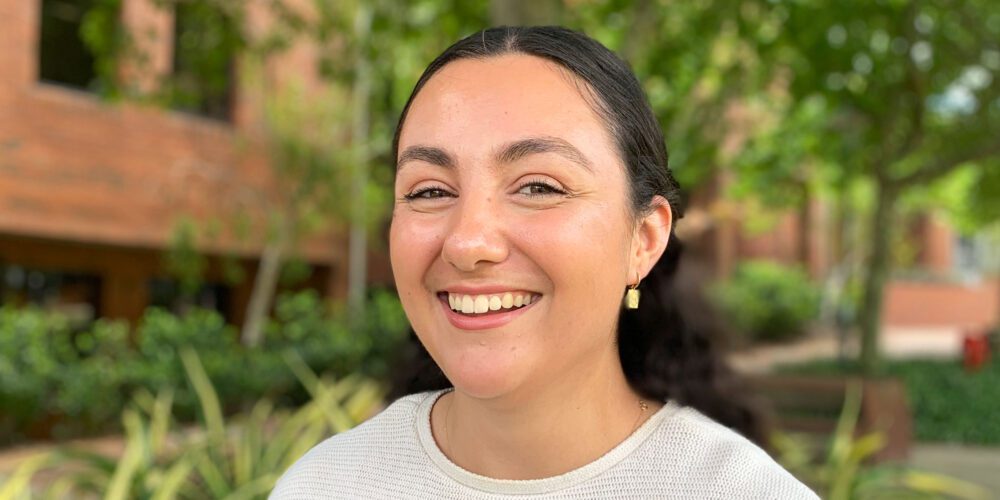What is one small decision you’ve made that has changed the course of your future? For economics and international business student Stephanie Tory, it was when she applied to attend Camp 2030 Global Innovation Lab, a week-long summer camp that empowers young people to work together to solve global problems.
Stephanie has always loved working with people. But it was her involvement in the John Curtin Scholarship Program (JCSP) and her volunteer work as a committee member for the Student Guild club, Women in Business, that sparked her passion for working with others to help build safe, supportive communities.
Now, as a member of one of the winning teams from this year’s Camp 2030, Stephanie is thrilled to be working on an innovative web platform that will increase employment opportunities for marginalised BIPOC (Black, Indigenous and People of Colour) communities by connecting them directly to mentors in the corporate world.
Stephanie first heard of Camp 2030 through an email about extracurricular opportunities sent by the JCSP team. Curious, Stephanie decided to learn more about the program.
What Stephanie discovered is that Camp 2030 Global Innovation Lab is a summer camp that invites 200 changemakers from all over the world to work together in small teams to develop solutions for global issues using the United Nations’ Sustainable Development Goals (SDGs) as a framework. At the end of the camp, each team gets to present their innovative solution to a panel of judges who decide the winning team within each division.
Keen to meet young changemakers like herself, Stephanie decided to step outside her comfort zone and apply. Just a few months later, Stephanie received the exciting news that she had been accepted into the Camp 2030 program.
For Stephanie, flying to New York City for Camp 2030 was a daunting experience, as she had never travelled solo and was nervous about missing her connecting flights.

Once she had landed, her nerves quickly disappeared. Though the camp attendees had travelled from over 60 different countries, they all found common ground when it came to their passion for sustainability and creating positive change in their communities and abroad.
While staying at a scenic summer campground in upstate New York for the week, Stephanie along with the other Camp 2030 attendees, were split up into small teams and asked to identify a global issue that falls under their team’s assigned Sustainable Development Goal.
Stephanie’s team was assigned SDG 8, which focuses on how we can improve access to decent work and boost global economic growth.
As a commerce student with a fascination for how economics can empower equity and equality, Stephanie was excited to work on SDG 8 with her teammates Sanah Malik, Pedro Canali and Mehmood Mehmood, who hailed from India, Brazil and Iraq respectively.
After a quick brainstorming session, Stephanie’s team realised that they were all passionate about the barriers to employment that marginalised BIPOC communities face due to racist and discriminatory machine learning algorithms and lack of networking opportunities.
With this global problem in mind, Stephanie and her team started developing their solution. Initially, they struggled to navigate their cultural differences and work together, as each team member had different expectations of what they hoped to achieve.
“Having the conversation about how we wanted to work as a team I think was quite challenging. I’ve never really had to do that before, but I think it was really crucial to how we got to our end result.”
For Stephanie, the process of tackling such a complex and interdisciplinary issue really opened her eyes to just how challenging global outreach programs can be, and how much dedication it takes from a team working behind the scenes to smooth out any logistical problems.
After a rigorous back-and-forth process of problem-solving and solution fine-tuning, Stephanie’s team came up with CorporateMentors.Org, an online platform that bypasses the discriminatory algorithms by connecting marginalised BIPOC communities directly to corporate mentors, thus increasing work opportunities for immigrants.
Whilst working on and finalising their solutions, the Camp 2030 attendees also participated in many social activities including cultural night, a quiz night and prom, which Stephanie says were a welcome break that helped her connect with members from other groups.
On their sixth and final day, each team travelled back to New York City to present their solution to a panel of experts. To Stephanie’s surprise, her team produced the winning solution under the SDG 8 division.
As winners of their division, Stephanie and her team are now working through a six-week program where they convert their initial pitch to an action plan, allowing them to implement a prototype of their suggested solution.
Excited to learn more about the innovation process, Stephanie says that she hopes to combine her economics degree with the teamwork and problem-solving skills she has learnt throughout her journey with Camp 2030 to give back to her local community in the future.
For Stephanie, the highlight of her time at Camp 2030 wasn’t the program itself, but the people she met along the way.
“I keep on talking about community, but I think it was just amazing to hear about the different perspectives everyone had… and how we were all able to be there at the same time working on the same solution.”
Though she didn’t know it at the time, Stephanie’s decision to simply give Camp 2030 a go has changed not only her future, but the future of so many others, and proved to her just how much you can change in one week.
This article was written by creative writing and professional writing and publishing student, Abbey Carson.



